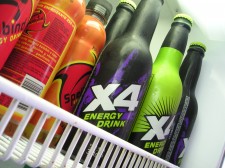 With the growing popularity of energy drinks such as Pepsi s AMP, Living Essentials 5-Hour Energy and Monster Beverage s Monster Energy Drink, the caffeine content in such beverages continues to be a pressing issue.
With the growing popularity of energy drinks such as Pepsi s AMP, Living Essentials 5-Hour Energy and Monster Beverage s Monster Energy Drink, the caffeine content in such beverages continues to be a pressing issue. With the growing popularity of energy drinks such as Pepsi s AMP, Living Essentials 5-Hour Energy and Monster Beverage s Monster Energy Drink, the caffeine content in such beverages continues to be a pressing issue.
With the growing popularity of energy drinks such as Pepsi s AMP, Living Essentials 5-Hour Energy and Monster Beverage s Monster Energy Drink, the caffeine content in such beverages continues to be a pressing issue.
In August, ACSH reported that New York attorney general had begun an investigation of whether the companies had violated federal law by promoting these drinks as dietary supplements rather than as foods. Because of the Dietary Supplement Health and Education Act, dietary supplements are much more loosely regulated than are foods.
Now the issue appears to have become national. Specifically, Monster Beverage Corporation s energy drinks have been cited in the deaths of five people in the past three years, according to incident reports recently released by the Food and Drug Administration. While the reports do not prove a link between Monster Energy and the deaths or other health problems, they may be a cause for concern.
The caffeine content in these beverages ranges from 80 to 500 milligrams, with Monster Energy Drink s 24-ounce can containing 240 mg. Given that a 12-ounce soda has about 50 mg of caffeine, and a 5-ounce coffee has about 100 mg, those who regularly down these energy drinks should probably be aware of the amounts of caffeine they contain.
ACSH s Dr. Josh Bloom had this to say: People should realize that these drinks are simply a drug mixed with sugar water. Caffeine is virtually identical in structure and function to the asthma drug theophylline, which has to be carefully monitored so that blood levels do not get too high. He continues, The maximum daily dose of theophlline is 900 mg and an overdose can be life-threatening. The fact that the manufacturers are allowed to load up a drink with 500 mg of caffeine (a similar stimulant) without even labeling it is insane.
ACSH s Dr. Gilbert Ross was more skeptical: To me, even the number of reported adverse effects over the course of several years and millions of servings does not rise to the level of such concern as to involve a U.S. senator, as has occurred here. [Sen. Dick Durbin, D-Ill., is asking the FDA to enforce caffeine limits in energy drinks]. And of course the fact that five deaths might have been linked to this drink is far from proving any relationship at all.
We here at ACSH believe that caffeine contents should be labeled, which is not currently required because these drinks are considered supplements. Until that occurs, we recommend that anyone with a hankering for a Monster Energy Drink or an AMP be aware they re taking in a lot of caffeine.


